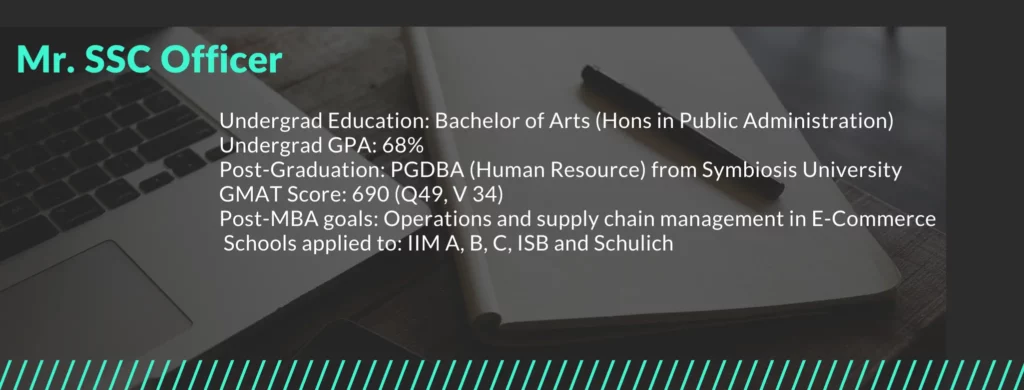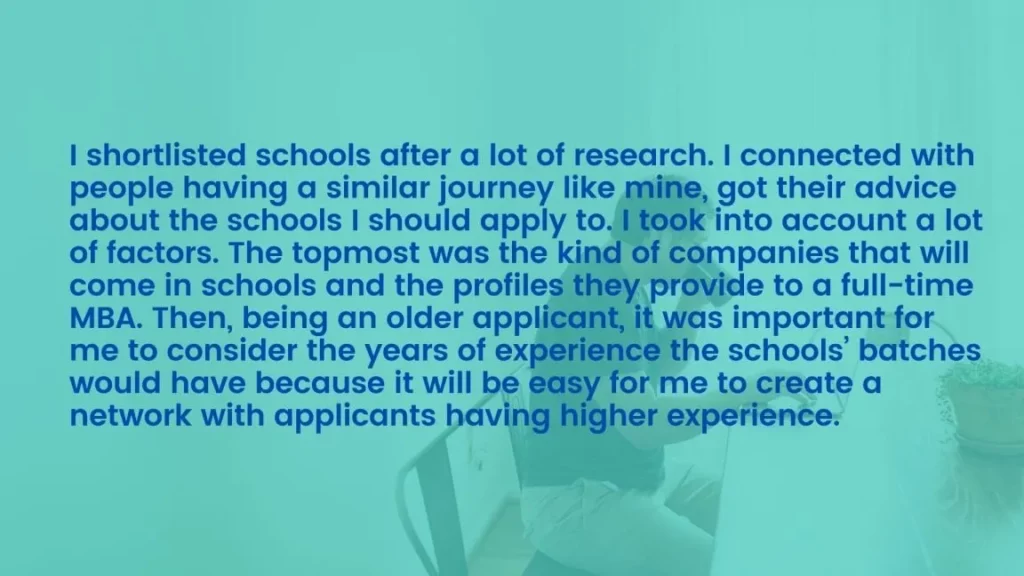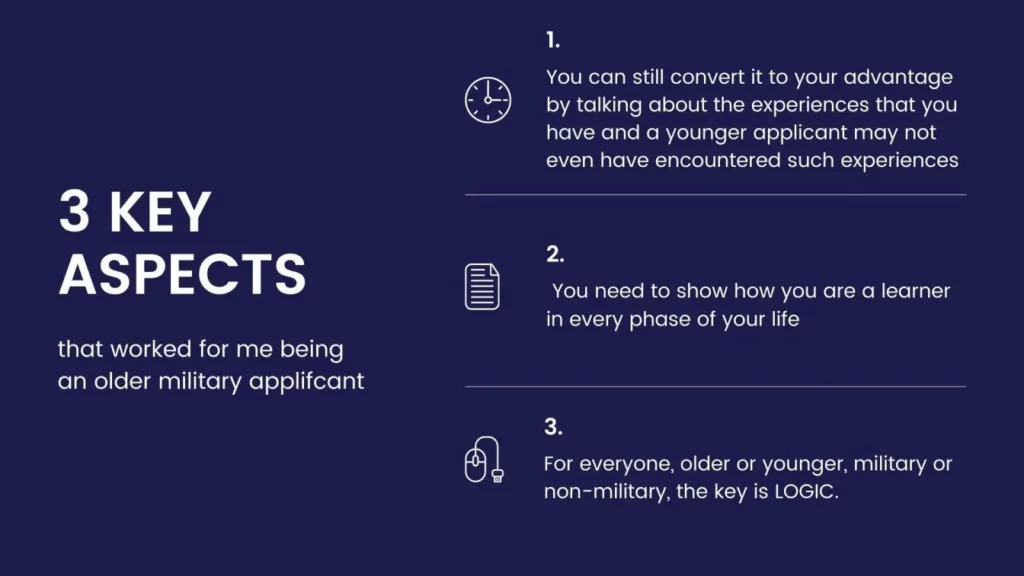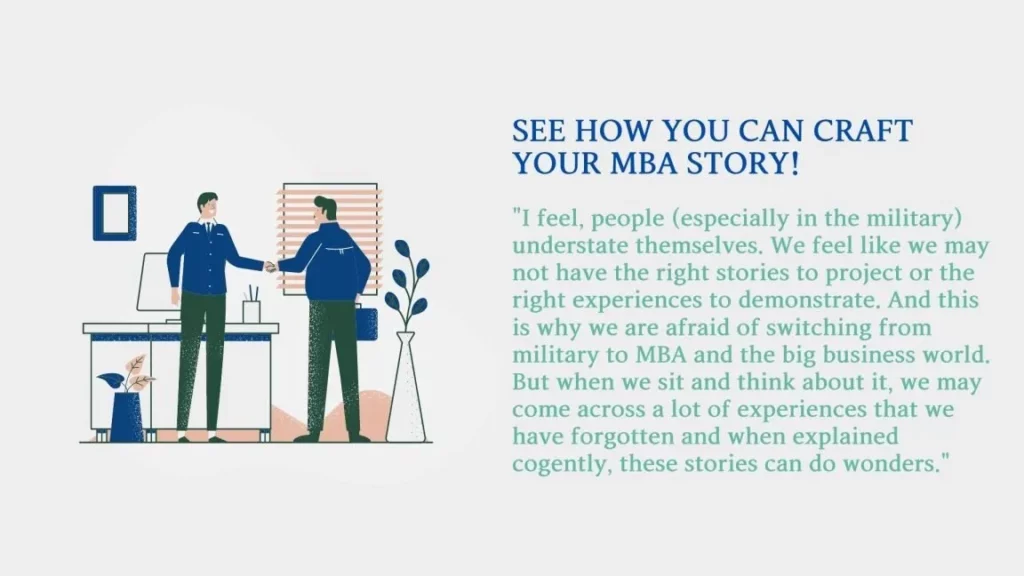Journey of a Military Veteran to MBA
Today, we are talking about a military veteran with 16 years of experience shaking traditional barriers and going for a full-time MBA inspiring all of us to be able to own up your own story, no matter what the system tells you.

Early Life
I come from a farmer’s family and I started working very early in my life, at the age of nineteen. I joined the military right after high school and completed my graduation during the early days of my job. So, in the crux, I served in Indian Air Force from 2004 to 2009, took my Combined Defense Services Exam, then underwent my training for one year at Officers Training Academy, Chennai, and was commissioned into the Indian Army as a Short Service Commissioned Officer.
Q: After Serving the Military for Sixteen Long Years, How the Plan of Switching From Military to MBA Came in the Picture
Being a short service commission officer, I had the option of either continuing with the job or take a risk of going into the corporate world. Well, I took a calculated risk. It was 2017 when I first started thinking about my options after my tenure gets completed and that is when the business world started intriguing me. I wanted to invest in myself before placing my foot into the corporate world and MBA was the most optimal choice for me to learn about the business functions in total and combine them with my core competencies in operations and supply chain management during my time at the school. So, even being an “older MBA applicant”, the leap from military to MBA made the most sense for me.
Q: Do You Think Your Prior Experience Helped You to Develop the Skills and Qualities Needed to Make This Leap From Military to MBA
I was involved in operations and supply chain during my tenure in the armed forces and with more research, I found out I have very good prospects for these functions in the business world. Also, I feel, the military is all about leadership. Every project of yours in some way helps build and demonstrate those experiences. So, in that way, the military experience has helped me build many relevant skills required to make this switch and exhibit them right in my applications.
Want to pursue an MBA but not sure if your profile fits?
Talk to our Profile Experts to know your chances for a top MBA Program.
GET A FREE PROFILE ANALYSISQ: How Did You Prepare the Portfolio of Schools That You Should Apply for Considering You Being an Older Applicant With a Non-traditional Military Experience

So, I have gotten admits from Schulich, IIM A, and C and am waiting for ISB. I shortlisted schools after a lot of research. I connected with people having a similar journey like mine, got their advice about the schools I should apply to. I took into account a lot of factors. The topmost was the kind of companies that will come in schools and the profiles they provide to a full-time MBA. Then, being an older applicant, it was important for me to consider the years of experience the schools’ batches would have because it will be easy for me to create a network with applicants having higher experience. Also, for me, short batches work better since they provide a good opportunity to mingle with every student of the batch.
I applied to Schulich because Canada can be a great place to settle and getting higher education from there has an added advantage of PR and work permits. Out of all the other Canadian schools, Schulich was making the most sense for me considering my older profile and my schedule to start with the classes. Also, the impact of COVID and the US leadership kept me away from applying to schools in the USA and Europe.
Q: How Was the Whole Application Journey for You and How Difficult Was It for You to Make This Transition From Military to MBA
The business world is very different from the armed forces and so this leap from military to MBA was not easy for me. People from our background are very new to the whole application procedure. And so, when we take the help of a consultancy, it is very important for us to find one that can understand us, our work-experience and our challenges to put forth the right picture. I, initially, started connecting with people on LinkedIn and getting their advice and started projecting my story.
Q: I Believe You Being an Older Applicant Must Be a Major Hiccup of Your Profile. How Did You Address That in Your Applications

So, you see, 16 years of experience can be a turn off for the adcoms given the requirement FT MBA programs have. But you can still convert it to your advantage by talking about the experiences that you have and a younger applicant may not even have encountered such experiences that you have.
Second, you need to show how you are a learner in every phase of your life and how you still can gain the most from an MBA that you otherwise cannot. Once you crack the initial round and get to the interview, you own the world. You have all the authority to now speak about YOU and you are not limited by topics or the number of words.
But for everyone, older or younger, military or non-military, the key is LOGIC. If you can make sense of how an MBA is the most right step for you now and how a school can give you the exact opportunities you need to reach your short-term and long-term goals, then I don’t see why you will not crack the admissions. And during the interview, schools like Schulich which has younger applicants were not even concerned about my huge experience.
Q: Any Tips for Older Applicants and Military Veterans Who Wish to Apply for Ft MBA

Well, when you write your essays, it all boils down to how you recognise yourself and project your story. Also, I feel, people (especially in the military) understate themselves. We feel like we may not have the right stories to project or the right experiences to demonstrate. And this is why we are afraid of switching from military to MBA and the big business world. But when we sit and think about it, we may come across a lot of experiences that we have forgotten and when explained cogently, these stories can do wonders.
I know a lot of people who had even more experience than I have and now they are in the best business schools in the world. And I also have seen people with a GMAT Score of 740-750 being rejected by the same schools I got admitted into. So, your story plays a much larger role, as long as it makes sense than any of your gaps, say, of being older applicants.
Also, the key to a good application is to introspect, introspect, introspect! I sat for 8-10 hours daily thinking about my stories and refining my application for about 2 weeks before I came out with my first drafts.
Also, this may sound like a cliche, but to all the people who have reservations about applying due to their gaps, I, from my experience, can say that if you won’t give it a go, you can never know what the future may lay.
HEY GUYS, SO WITH THIS STORY, I THINK MANY OF US WILL BE ABLE TO CONQUER OUR DIFFERENT FEARS AND INSECURITIES AND BE ABLE TO MAKE THE RIGHT STRATEGY FOR OUR DREAM SCHOOLS. I AND MY TEAM HAVE ALWAYS BELIEVED IN THE STORY OF PEOPLE AND THIS IS WHY MANY TIMES HELPED PEOPLE GET INTO THEIR DREAM SCHOOLS IN SPITE OF THEIR MANY HUGE GAPS. YOU MAY READ A FEW STORIES.
– SHANTANU




Leave a Reply